Meet Rahabu, the shop owner from Nyarubuye
Five years ago, Rahabu Mukampenda couldn’t get credit. Today, she provides it. And to think it’s all down to a few simple skills she learned at a Village Savings and Loans Group.
Tomato catch-up
Stop by Rahabu’s bustling shop in Burembo village, Rwanda and there’s a few things you’ll quickly notice. First, the variety of stock. The 44-year-old started out in 2010 with a crop of tomatoes she’d grown herself, having noted their popularity in nearby markets, but today her bestsellers range from cooking oil to body lotion, each chosen to satisfy customer demand.
Second is the abundance of customers. There are two nearby shops in Rahuba’s corner of Nyarubuye district, Eastern Province, but neither is as conveniently located. As a result she nets 20,000 Rwandan Francs (US $30) a month.
A long way travelled, a longer way to go
The human cost of Rwanda’s genocide is well-known, if inconceivable: over the course of 100 days in 1994 an estimated 800,000 were killed, literally decimating the country’s population. The economic cost is underreported, if staggering: in ’94 alone, growth dropped by 50 percent while inflation rose to 64 percent. The plunge helps explain how, despite high growth rates and decreasing poverty, the country remains one where almost 80 percent of the population is involved in farming, most at the subsistence level.
Rahabu was one of them. Back in 2009, before she joined a Village Savings and Loans Group organised by Hand in Hand Eastern Africa field partner CARE Rwanda, the mother of seven daughters aged 6 to 23 tended a small patch of land for 12 hours a day, growing just enough for the family to eat once daily. Soap, new clothes and secondary school fees were out of the question.
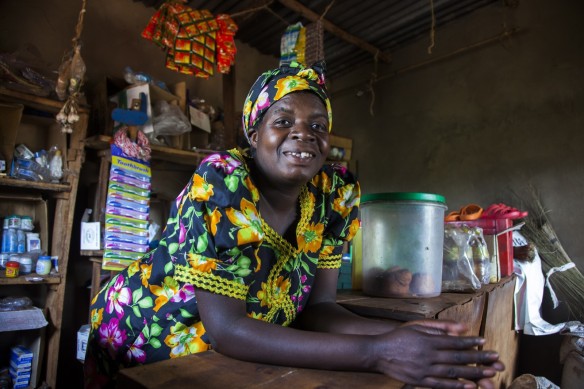 When she first joined the group, Rahabu worked for others to earn the 400 RWF (US $0.60) in required weekly savings. Discipline came easy. “You sometimes go to market to buy beans but when you are there you see something else that you would like and so you spend more than you meant to,” she said. “Because of the training I learned to buy what I need and save the rest.”
When she first joined the group, Rahabu worked for others to earn the 400 RWF (US $0.60) in required weekly savings. Discipline came easy. “You sometimes go to market to buy beans but when you are there you see something else that you would like and so you spend more than you meant to,” she said. “Because of the training I learned to buy what I need and save the rest.”
Having learned how to save, Rahabu soon graduated to learning basic financial and marketing skills. Now she’ll hold on to stock until prices rise, or extend credit to customers who can’t afford the essentials.
The dish
Back at home, things have changed immeasurably. Rahabu didn’t just buy dishes – she bought cupboards to store them. She even bought a modern stove. Even better, she says, her four youngest children will attend secondary school – a first in the family. With success like that, Rahubu’s husband Mutabagisha has been happy to take over the family farm. And Rahabu? She’s busy puzzling over her next move: how to expand her business.
Rahabu’s results
In 2013, Hand in Hand Eastern Africa and CARE Rwanda co-operated to empower some 100,000 Rwandans, mostly women, to work their way out of poverty by running their own sustainable businesses. The three-year, US $3.2 million partnership was grounded in our shared belief in the power of entrepreneurship to fight poverty.
Meet Parvathi, the glove manufacturer from Tamil Nadu
With three children, one employee and a fast-growing business, Parvathi is the archetypal Hand in Hand entrepreneur. There’s just one difference: more than anyone we’ve met, the 52-year-old proves that it pays to invest in your children’s education. Literally.
Parvathi joined Hand in Hand and quickly set about establishing a knitting and embroidering enterprise. It wasn’t wildly successful, she says, but it earned enough to help put her children through university. Business was humming along fine when, a few years back, her son got his first job as an engineer – and along with it his first pair of protective gloves. And his second. And his third. Shocked at the quantity of gloves his workplace devoured, Parvathi’s son suggested she start a new line of business: manufacturing protective gloves. The switch wouldn’t be easy. For one, she would need to import an INR 500,000 (US $8,300) machine from Japan. But as a Hand in Hand Self-Help Group member for eight years, Parvathi knew where to turn.
Rural unemployment
Women entrepreneurs face huge barriers in India. According to the International Labour Organization the country ranks 120 out of 131 in women’s labour force participation. Rurally, barely one in three women work – 19.5 million fewer than just five years ago. The numbers are borne out in Tamil Nadu, the southern India state Parvathi calls home. More than 20 percent of residents here live below the poverty line, most of them rural. Access to credit can make all the difference.
Parvathi’s neighbourhood
Breaking the thatched ceiling
Parvathi borrowed the money from her group, imported the machine from Japan and got to work. Although her expenses had grown – materials had to be in ordered in bulk from Coimbatore almost 500 km away – so too did her profits. Parvathi now owns two knitting machines yielding INR 176,000 (US $2,900) a month, INR 54,800 (US $912) in pure profit. Loans to buy two more are pending.
“Ten years ago, I was even scared to go out of the house and speak to anyone,” she says. “Now I have even learned how to speak with bankers.”
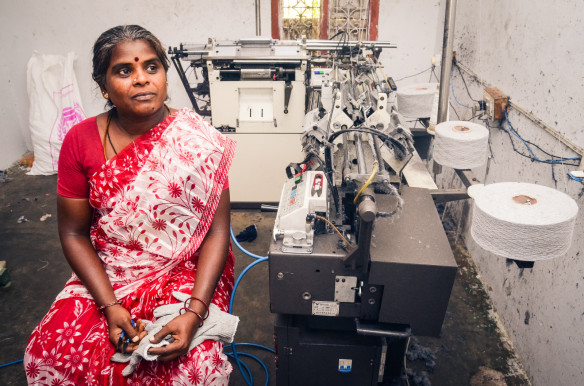 Parvathi’s self-confidence isn’t the only thing to have improved. Where once they shared a one-room thatched-roof hut, Parvathi’s family now live in a brand new concrete home. For the first time, the future looks bright.
Parvathi’s self-confidence isn’t the only thing to have improved. Where once they shared a one-room thatched-roof hut, Parvathi’s family now live in a brand new concrete home. For the first time, the future looks bright.
“I want to safeguard the future of my children with this business,” says Parvathi. And indeed she has. Only a year after starting his career as an engineer, Parvathi’s son is coming to work for the family business. The opportunities, he’d told her, are better.
“I worked hard and they rested,” she says. “Now it is my turn to rest and theirs to work”.
Parvathi’s results
Meet Florida, the young mother saving to put her children through school
So often, beneficiaries in the developing world are reduced to cold numbers. But ask Florida Mukarugema what’s been the biggest change since she opened her shop and her answer won’t fit on any graph. “I am feeling happy. I am no longer crying.”
Florida joined a Village Savings and Loan group organised by Hand in Hand field partner CARE in 2009, driven, like so many others, by sheer desperation. “We used to eat just once a day, in the evening. We didn’t have our own home but stayed with others. I couldn’t even afford a bunch of bananas,” she says.
How things have changed. Today, bananas are Florida’s bestselling item, the staple around which the young mother built her growing business, which also sells rice, maize flour and more. Recently, with help from a Hand in Hand business trainer, she borrowed 108,000 Rwandan francs (US $158) to build a water facility and sell clean water. Tally her earnings from both and Florida’s annual income is 1,200,000 RWF (US $1,760), almost ten times what she made previously and three times the gross national income per capita.
A country rebuilds
Life in Rwanda has improved beyond description in the 20 years since genocide convulsed the country, claiming some 800,000 lives in just 100 days. The economy is growing at upwards of 8 percent a year. Rwanda was- “top-performing” at the Millennium Development Goals, according to the UN. Social progress, evinced by the world’s greatest proportion of women MPs – 64 percent – has been undeniable. And yet there remains a hugely long way to go.
Florida’s neighborhood
Rural Rwanda, home to Florida’s Eastern Province village of Kinamba, experiences three times more poverty than urban Rwanda. Countrywide, more than 80 percent of Rwandans are engaged in agriculture, many at the subsistence level. And almost a third of Rwandans are considered undernourished by the International Food Policy Research Institute.
Savings and loans
Florida was one of them. Then she borrowed 15,000 RWF (US $22) from her Village Savings and Loan group and bought three bundles of bananas, which quickly sold for 28,000 RWF (US $41). Buoyed by a series of ever-bigger successes, Florida went on to borrow 200,000 RWF (US $294) from her group to open a shop.
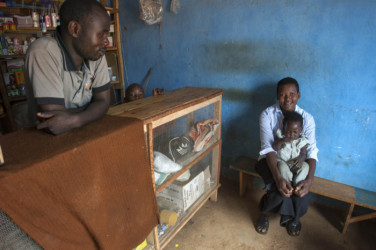
“Before I joined the group I was not even able to buy salt,” she says. “I did not know how to use the bank and I did not understand how to buy and sell and make a profit.”
Today, Florida, her husband and the couple’s four children – two of whom are adopted – live in a furnished three-room home with clean water. “I will make sure they go to university and then live in a nice place,” she says.
Florida’s results
Annual income of 1,200,000 RWF (US $1,760) – 10 times her previous income
200,000 RWF (US $290) in savings
Saving to pay for children’s university fees
Hand in Hand Eastern Africa and CARE Rwanda are co-operating to empower some 100,000 Rwandans, mostly women, to work their way out of poverty by running their own sustainable businesses. The three-year, US $3.2 million partnership is grounded in our shared belief in the power of entrepreneurship to fight poverty.
Meet greenhouse farmer Alice Maina
At an age where most people would think of retiring, Alice Maina has started a flourishing small agri-business which will set her and her husband up safely for old age. Thanks to Hand in Hand’s support she now earns KES 20,000 (US $231) a month selling tomatoes and ‘piri piri’ chilli peppers, grown in a greenhouse which she built on her land.
Making ends meet
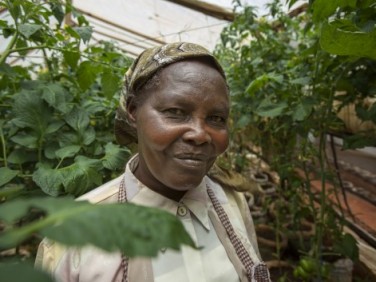 Alice lives in a hamlet near Gatundu, in Kiambu county, which despite being only 16 kilometres north of Nairobi is a lush rural area dominated by large commercial farms growing coffee, tea and pineapples. Automation means these farms do not offer much local employment. Instead, most people here are subsistence farmers who just about manage to live off small family-owned plots, which are shrinking in size as the population continues to grow. Alice was a public school teacher – a poorly paid profession in Kenya – when arthritis forced her to retire early. She and her husband were growing vegetables for their own consumption.
Alice lives in a hamlet near Gatundu, in Kiambu county, which despite being only 16 kilometres north of Nairobi is a lush rural area dominated by large commercial farms growing coffee, tea and pineapples. Automation means these farms do not offer much local employment. Instead, most people here are subsistence farmers who just about manage to live off small family-owned plots, which are shrinking in size as the population continues to grow. Alice was a public school teacher – a poorly paid profession in Kenya – when arthritis forced her to retire early. She and her husband were growing vegetables for their own consumption.
Gatundu, Kenya
A bold investment
When Hand in Hand started training her local members’ group, Alice recognized that in order to survive she needed to make her only asset work harder. Alice borrowed money from her local group’s savings fund to buy piri piri chilli seeds, knowing the small peppers fetch a good price on the local market. Her first crop of chillies produced an income of KES 48,000 (US $550) in two months. “I made a good profit because I cut out the middle man and went to the market myself to sell the chillies,” says Alice.
Alice then used KES 15,000 (US $170) of the proceeds and a loan of KES 100,000 (US $1,000) from Kenya’s leading microfinance institution, to whom her Hand in Hand trainer introduced her, to build a small greenhouse.
Thriving on tomatoes
Thanks to the greenhouse, she managed to grow a sizeable crop of beautiful tomatoes. The former teacher has a keen understanding of competition and attributes her commercial success to three things: “Better quality – my greenhouse tomatoes taste better than the normal ones. Good presentation – I always wash them and put them in nice boxes. And last, I’m a good saleswoman – I make sure to talk to all my customers. That’s why I sell more than others.”
“I cut out the middle man and went to the market myself”
Alice feels that the Hand in Hand business training has protected her economic future. “Ten shillings used to buy me flour, sugar, tomatoes and even milk, but now it hardly buys me anything. Life has changed and so I need to change.”
Not content to stand still, she is looking forward to a bigger second crop of tomatoes now. Her Hand in Hand trainer introduced her to a farming expert from the Kenyan Ministry of Agriculture to show her better horticulture techniques.
Sharing success
She is also employing Patrick Kahuni (pictured right), one of her neighbours, to water, fertilise and weed the plants while she goes to the market. Patrick,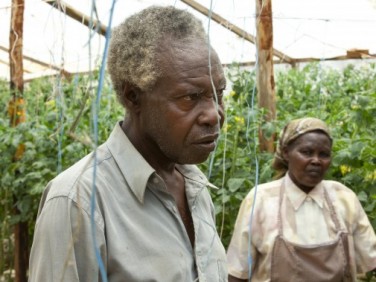 a father of ten, also farms his own ancestral land but, like Alice, could not make it pay. As a result, Patrick could not afford Kenya’s secondary school fees and four of his chyildren had to drop out of school. Working for Alice has meant that Patrick has managed to put one of his children through secondary education.
a father of ten, also farms his own ancestral land but, like Alice, could not make it pay. As a result, Patrick could not afford Kenya’s secondary school fees and four of his chyildren had to drop out of school. Working for Alice has meant that Patrick has managed to put one of his children through secondary education.
Alice herself is funding her granddaughter’s secondary schooling and is saving up for her own old age.
“I am over 60 now so, God willing, one day I will not have to work anymore. I want to save today, for tomorrow. I want to work hard then retire.”
Alice’s results
Monthly income of KES 20,000 (US $231)
Funds granddaughter’s schooling
Employs neighbour with a family of 10
Padmavathi, sculptor
Padmavathi is a 26-year-old mother of two. For her and her family life has been a long struggle. Although she was born into a sculpting family, and learnt the skill as a child, Padmavathi soon discovered it was not considered a profession for women. Her education was short-lived and then she was married off to a sculptor. Unfortunately, orders were hard to come by and their income was meagre.
Then Padmavathi heard about Hand in Hand and joined a Self-Help Group, where she was taught how to save, the basics of accounting and how to expand a small business. She took a loan not only to expand her husband’s business by buying raw material and better tools but also to take up sculpting herself.
She has already paid back that first loan and says “Repayment is not a problem. I made sure the loan is used only for business.”
The village still marvels at her transformation into a self-assured professional sculptor who earns anywhere between INR 7,000 and INR 10,000 a month (US $150 – 200).
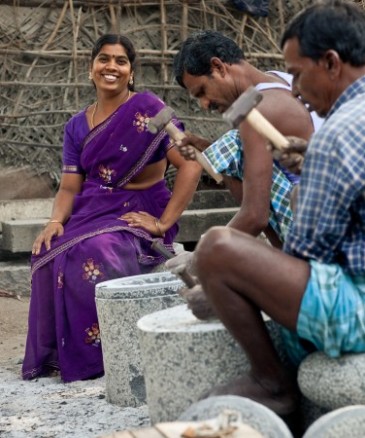
Meet Mushtary, Rejin’s first female shop owner
Mushtary is breaking new ground as a shopkeeper and entrepreneur in the rural village of Rejin, Afghanistan.
A shop to stave off hunger
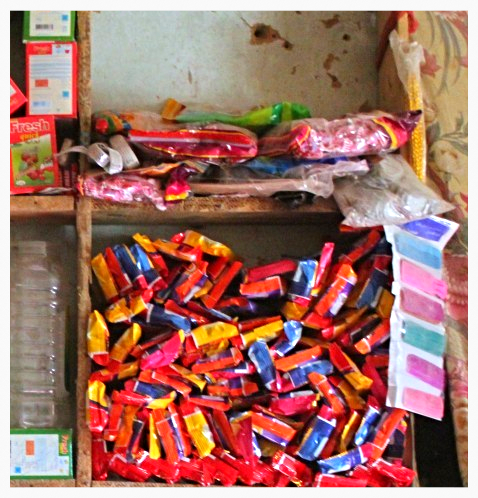
Mushtary’s shop |Products on shelf | Balk province, Afghanistan
The regular profits from her business enable her to supplement the small and variable income the family gets from farming. “Farming in our area is risky because we rely on the rain and if the weather is not right then we lose everything. The shop means that even in the bad times we can buy food to eat.”
Initially Mushtary and her neighbours joined the Self-Help Group set up by Hand in Hand Afghanistan in their village out of curiosity but quickly realised that there was so much they could learn. Together the group of 20 members began saving a little money each week to build up a group savings fund and learnt basic business skills such as bookkeeping.
Historically the people in Rejin village are farmers, so the majority of the members in the group decided to use their new skills to branch out into animal husbandry. Mushtary had other ideas. She and her husband had struggled for many years to support their family on the income from farming but they could not rely on this income. Everything depended on the weather. Mushtary saw an opportunity to stabilise the family income.
Rejin’s first retailer
Rejin is an isolated rural village. Women have to travel long distances to buy everyday household items and Mushtary realised that if there was a shop in the village, local people would chose to buy what they needed here. So, Mushtary borrowed from the group fund in order to buy her initial stock of clothes. These sold so well that Mushtary made a profit of AFN 5,000 (US $96). From this small beginning she went on to borrow a further AFN 10,000 (US $192) and has now opened a shop selling tea, sugar, biscuits, chewing gum, shampoo, washing up liquid, soap and many more necessary items.
“Even in the bad times we can buy food to eat”
Najma, the cycle repair shop owner
Najma did not know life could change so much for the better, even after the age of 40. As she works alongside her husband in their new cycle repair shop, she feels extremely proud of her capabilities and her newfound role as entrepreneur.
From unpaid housework to respected entrepreneur
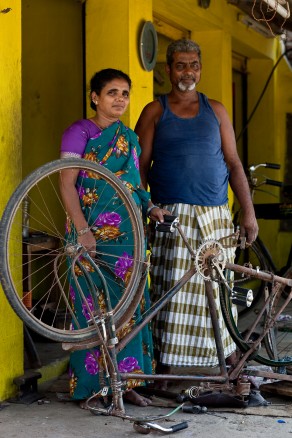 Najma joined the Self-Help Group in her village where she found that she was part of a community of women who spoke about common problems and who encouraged each other. She learnt about regular savings, basic accounting and the power of loans. She was given enterprise development and vocational training.
Najma joined the Self-Help Group in her village where she found that she was part of a community of women who spoke about common problems and who encouraged each other. She learnt about regular savings, basic accounting and the power of loans. She was given enterprise development and vocational training.
First, the group was allowed to lend money internally. When their repayment record was established and their training complete, they became eligible for external loans, facilitated by Hand in Hand.
Najma found the confidence to ask for an INR 12,000 (US $200) loan, which she used to set up a cycle shop. She purchased spare parts and basic tools for cycle repair. She knew she could do good business with villagers wanting spares and repairs all the time.
“It feels good to be able to earn some money”
A brighter future
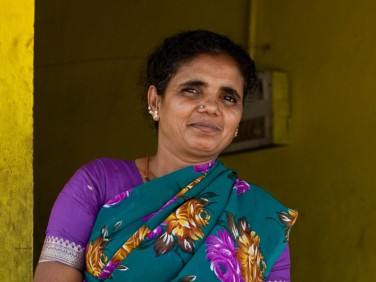
Her earnings have helped her family raise its standard of living. It has also made a big difference to her status in the family and in society. Najma feels proud that she can sign papers and manage the finances of the business so well.
She expects to repay the loan soon with the income from the shop and, in fact, plans to take another loan to upgrade the business. Najma has successfully made the transition from unpaid housework to respected entrepreneur.
Feroza, the 22-year-old mother with plans to expand her enterprise
Feroza was one step ahead of Hand in Hand when we arrived in Balkh, the north Afghanistan province she calls home. At 22, she already earned a small income tailoring clothes for her neighbours. Still, even by the modest standards of her small village, money was tight. So when she heard Hand in Hand was offering business training she jumped at the chance.
Since then her income has quadrupled, bringing the new mother off subsistence wages and elevating her status at home and in the community.
Balkh province, Afghanistan
Tailored market research
“Before (joining a Self-Help Group) I didn’t know about market surveys or pricing,” says Feroza, putting the finishing touches on an ornate red shawl as her daughter looks on. “I’ve also started sewing seasonal products and selling at the markets in Mazar-i-Sharif (the closest major city). It’s made a huge difference; I now earn 3,775AFN (US $68) a month.”
“My new income means I can support my children the way I think is best, without waiting for anyone’s approval”
Future sewn up
Afghanistan’s child mortality rate is the highest outside sub-Saharan Africa: 99 out of every 1,000 children die before turning 5. (In Sweden, as a point of comparison, that number is 3 per 1,000.) Education, though improving, has historically been rare.
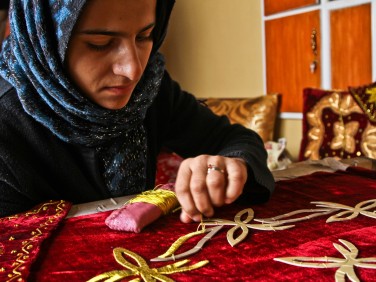 Still, Feroza has every reason to be hopeful about her children’s future. Besides enabling her to buy more nutritious food, a growing income will help pay for crucial healthcare to protect them from illness, and school supplies when she gets older.
Still, Feroza has every reason to be hopeful about her children’s future. Besides enabling her to buy more nutritious food, a growing income will help pay for crucial healthcare to protect them from illness, and school supplies when she gets older.
“My new income means I can support my children the way I think is best, without waiting for anyone’s approval,” she says. It’s no surprise.
And that’s not the only benefit for the future. To meet the growing demand for the bedding and clothes she tailors, Feroza has taken on three young people from her village as apprentices, some of them mothers themselves. Each earns a share of the income from the pieces they sew, and all have plans to become fully-fledged tailors.
Ever the entrepreneur, Feroza has no intention of stopping there. “I plan to expand my enterprise, hire and train more people, increase my production and target new clients,” she says.
Feroza’s results
![]()
Monthly earnings 3,775 AFN (US $68)
![]()
Able to provide healthcare, nutritious food and education for her children
![]()
Hired three apprentices from local community
Meet Najia, Nahri Shahi district’s most canny businesswoman
Najia is a canny entrepreneur in more ways than one. Armed with nothing but her wits and the skills she learned at a Hand in Hand Afghanistan Self-Help Group, the mother of four increased her income from zero to 40,000AFN (US $720) a month – all by selling canned goods.
Financial success has of course been rewarding, says Najia, who like most Afghans has no surname. But a newfound sense of empowerment makes the long, often gruelling hours especially worthwhile. “My life has totally changed,” she says. “I’m no longer dependent on anyone else’s income and I can easily purchase clothes and school materials and take my children to the doctor. I’m even saving for emergencies – and to expand my enterprise.”
Loans, not grants
Like any budding entrepreneur, Najia needed credit. There was just one problem: she didn’t qualify, not even for a microloan. Self-Help Groups offer members the opportunity to learn, to develop opportunities, even simply to socialise outside the home. They also offer access to group savings funds, available to members who’ve paid in and undergone training. As soon as she was ready, Najia applied for a loan using a strategy every bit as simple as it was effective: serving her food to group members and letting it do the talking. The group was convinced; Najia got her loan.
“I had the talent,” she says, “but I didn’t know the basics of enterprise. Hand in Hand Afghanistan mentors helped me establish myself, both in terms of training and funding.”
“My life has totally changed. I’m no longer dependent on anyone else’s income and I can easily purchase clothes and school materials and take my children to the doctor”
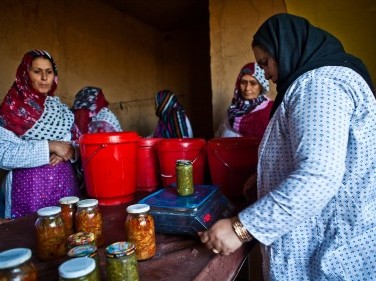
Najia secured two loans – 21,000AFN (US $378) from her group then 10,000AFN (US $180) from Hand in Hand, both now paid off. The first went to setting up her operation, the second to diversifying her product range.
“We prepare cans of pre-cooked meals with ingredients including okra, eggplant, peas, noodles and meat. I also make ketchup and jam,” she explains. “My meals are good quality and I supply them to the market quickly.”
Super markets
Starting out, Najia sold her food in neighbouring villages. Drawing on the lessons she’d learned about market linkages, she soon moved into Mazar-i Sharif. Then came her biggest success yet: a deal supplying food to the Ariana Supermarket.
Today, Najia has 18 part-time staff. She hopes to hire them full-time soon. “We plan to establish a small food product manufacturing plant with modern labelling machines to compete with imported cans,” she says.
Building confidence
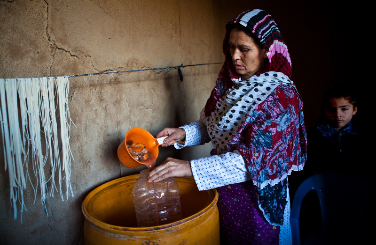 Impressive as it is, Najia’s success is not unique. According to a recent independent review commissioned by the Swedish International Development Cooperation Agency (Sida), Afghans are reaping the benefits of Hand in Hand’s programmes, citing the value of training and savings, as well as a newfound freedom of movement. Others meanwhile credited interaction among group members with instilling a new sense of self-confidence. Not surprisingly, Najia was among them.
Impressive as it is, Najia’s success is not unique. According to a recent independent review commissioned by the Swedish International Development Cooperation Agency (Sida), Afghans are reaping the benefits of Hand in Hand’s programmes, citing the value of training and savings, as well as a newfound freedom of movement. Others meanwhile credited interaction among group members with instilling a new sense of self-confidence. Not surprisingly, Najia was among them.
“I feel happy I decided to start my own business,” she says. “And confident to expand it.”
Najia’s results
![]()
Increased monthly income from 0 to 40,000 AFN (US $720)
![]()
Expanded business to other districts and local supermarkets
![]()
Employed 19 part-time staff
Meet Gloria, the former refugee growing crops – and profits
It took 15 years for Gloria Kabagwira to get back to her native Rwanda. With the right training and access to credit, it only took three more for the 46-year-old to become one of her district’s most successful farmers.
A country of farmers
Rwanda is on the rise. In its efforts to meet the Millennium Development Goals, says the UN, the country was “top-performing”. But despite a sizeable mining sector and ambitious government plans to electrify 70 percent of homes and businesses by 2017, Rwanda’s economy remains overwhelmingly agricultural. Almost 80 percent of the population is engaged in farming, most at the subsistence level.
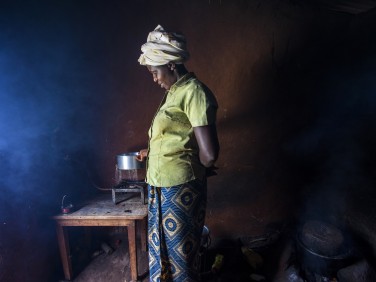 Gloria’s village is no exception. Here in Mpanga, some 12 miles from the nearest paved road, homes are made from mud bricks, electricity is non-existent and the nearest water pump is a good half-mile away. “And it’s not good water,” she says.
Gloria’s village is no exception. Here in Mpanga, some 12 miles from the nearest paved road, homes are made from mud bricks, electricity is non-existent and the nearest water pump is a good half-mile away. “And it’s not good water,” she says.
Twenty years ago, the Rwandan genocide claimed an estimated 800,000 lives. Another 800,000 people were displaced. Gloria, who returned from Tanzania in 2009 after the government promised her a free hectare of land, was among them. “When we came back we were poor. The government gave us the land but we did not know how to use it,” she says. “We survived because in this area it is easy to grow bananas and maize. Not much else, though.”
Mpanga region, Rwanda
Life savings
Things began to change in 2011 when Gloria joined a local community savings group, compelled by a mixture of curiosity and desperation. For the first time in her life, the mother of eight had access to skills and business training.
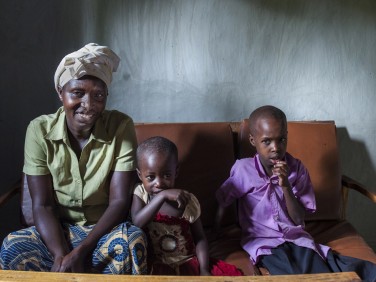 Crucially, she could also access credit via the group fund. “I contributed 400 Rwandan Francs (US $0.60) a week by working in the fields,” she says. “It wasn’t easy, but it was worth it.” Before long, the 30-strong group was ready to start lending. Gloria, meanwhile, was ready to borrow. “I was growing a few crops to eat but I knew that if I grew tomatoes and cabbages then I would be able to sell them, so I took a loan from the group of 25,000 RWF (US $36) to buy tomato seedlings,” she says. “It was a lot. I was afraid how to pay it back, it was so big.” But pay it back she did. Today, Gloria’s crops bring in some 500,000 RWF (US $720) a season, $250,000 RWF (US $360) in pure profit. And she isn’t stopping there.
Crucially, she could also access credit via the group fund. “I contributed 400 Rwandan Francs (US $0.60) a week by working in the fields,” she says. “It wasn’t easy, but it was worth it.” Before long, the 30-strong group was ready to start lending. Gloria, meanwhile, was ready to borrow. “I was growing a few crops to eat but I knew that if I grew tomatoes and cabbages then I would be able to sell them, so I took a loan from the group of 25,000 RWF (US $36) to buy tomato seedlings,” she says. “It was a lot. I was afraid how to pay it back, it was so big.” But pay it back she did. Today, Gloria’s crops bring in some 500,000 RWF (US $720) a season, $250,000 RWF (US $360) in pure profit. And she isn’t stopping there.
A capital idea
Between her own savings and help from the Rwandan government’s agricultural grants scheme, also facilitated by the group, Gloria has managed to build a water reservoir and instal her own biogas system, erasing the need to forage for fuel. She’s also expanded her acreage to grow passion fruit and papaya.
She credits her new income with much more than an improved quality of life. “In Rwanda, if you are a woman you look to everything from your husband. If you need salt, soap or clothes you must ask. You feel like you don’t have value,” she says. “Today I no longer have to beg from my husband. We share responsibility.”
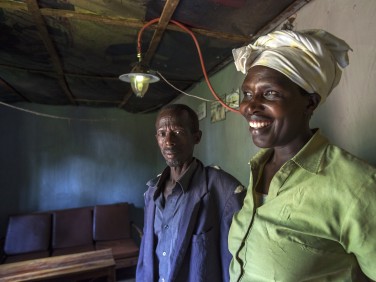 For all her success, Gloria has even bigger plans for her children:
For all her success, Gloria has even bigger plans for her children:
“I don’t want them to cultivate vegetables. I want them to get a good education and learn to speak English so that they can get good jobs.”
Gloria’s results
![]()
250,000 RWF (US $360) in pure profit per season
One of her district’s most successful farmers
![]()
Greater financial autonomy within the family
Hand in Hand Eastern Africa and CARE Rwanda are co-operating to empower some 100,000 Rwandans, mostly women, to work their way out of poverty by running their own sustainable businesses. The three-year, US $3.2 million partnership is grounded in our shared belief in the power of entrepreneurship to fight poverty.
